Australian election: Where is climate change on the agenda?
The majority of Australians want action on climate change, but you would not know that from the campaign for Saturday’s election.
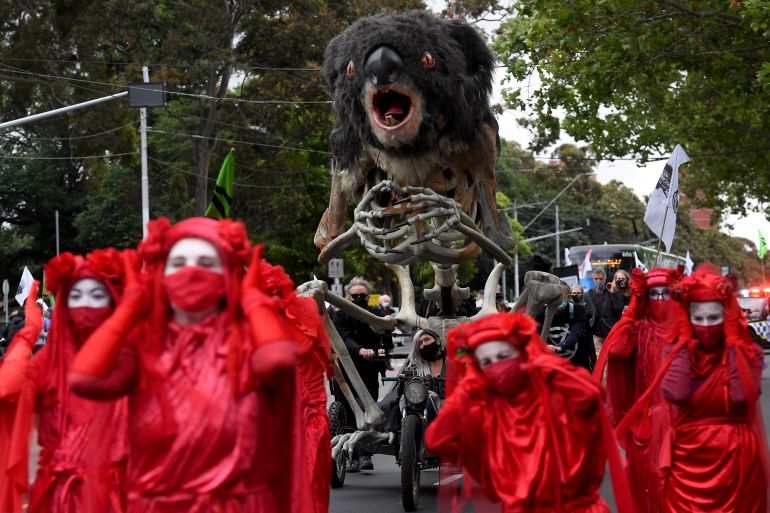
Canberra, Australia – As southern Australia continues to recover from the destruction of the 2019-2020 ‘Black Summer’ bushfires, towns in Queensland and New South Wales (NSW) have just experienced devastating floods.
Some towns have even seen ‘once in 100 year’ floods occur twice in several weeks. In Lismore, an NSW town of nearly 30,000 people, the river rose more than 14 metres in late February, breaching the town’s levees and inundating people’s homes and businesses. Thousands of residents were forced to take refuge on their roofs.
Keep reading
list of 4 items‘Aggressive act’: Australia says it tracked Chinese spy ship
Australia looks to fill Asia’s energy gap amid Ukraine crisis
Australia PM to ‘ensure’ no Chinese base on Solomon Islands
Lismore flooded again in March. More than 2,000 homes are now considered uninhabitable.
While Lismore has flooded five times in the past 60 years, this year’s floods were 2 metres above the previous historic high. Across NSW and Queensland, 22 people died.
As with the Black Summer bushfires, the federal government has been criticised for being too slow to respond. Locals relied on their own communities to provide crucial assistance in the immediate aftermath of the disaster and Lismore residents later took their flood-damaged belongings to Prime Minister Scott Morrison’s official residence, dumping ruined armchairs and soft toys at his gate. Some held placards that read ‘Your climate inaction killed my neighbour’.
The cost of the floods is expected to exceed 2 billion Australian dollars ($1.44 bn), making it one of the country’s most costly natural disasters ever.
“Despite decades of warnings from scientists about climate change, Australia is unprepared for the supercharged weather that it is now driving,” said Hilary Bambrick, co-author of Australia’s annual assessment of progress on climate adaptation.
“Australia is at the forefront of severe climate change … Climate change means that Australia’s extreme weather – heat, drought, bushfires and floods – will continue to get much, much worse if we don’t act now.”
Despite this and voters’ desire for action, climate change has barely been a talking point in campaigning for the country’s federal election, which will take place in less than a week on May 21.
“Australians are hyper concerned about climate change,” University of Tasmania political scientist Kate Crowley told Al Jazeera. ”But the major parties, especially the [ruling] Coalition, don’t want to talk about climate change. For them, it’s done and dusted.
“The Coalition has a ‘never never’ target and no immediate plans to do anything, except ensure fossil fuels are in the mix.”
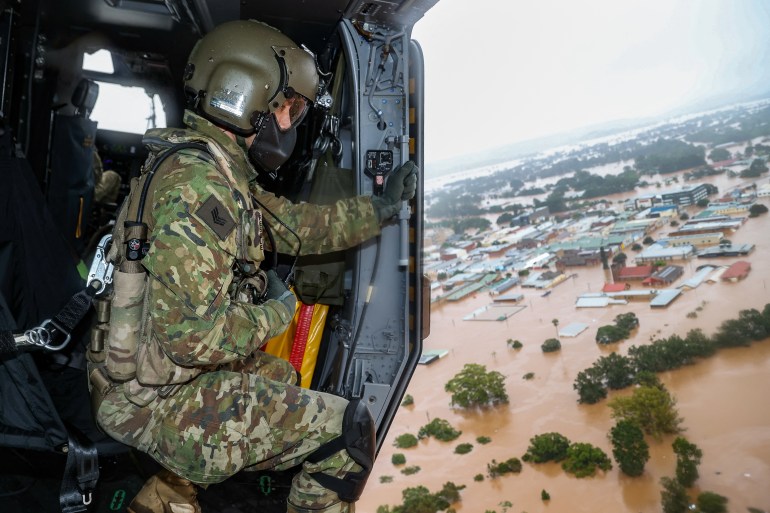
Most politicians in Scott Morrison’s Liberal-National Coalition are climate change sceptics, if not outright deniers, as well as being economically and socially conservative.
Climate writer Ketan Joshi has been tracking politicians’ social media mentions of climate change.
He found that just four percent of tweets from senators and three percent of tweets from members of parliament mentioned climate in the first week of the campaign. Most did not tweet about climate change at all.
“Tweets are a proxy for discourse,” Joshi explained. “It’s a really simple read on [the issue’s] prominence, and it turns out that even when climate is mentioned in bad faith, it’s still only a tiny, tiny proportion of the discussion.”
Joshi believes there are two main reasons for the lack of discussion around climate change.
“One is that the issue isn’t prominent enough, considering its physical urgency,” he said. “The second is that when it is discussed, it’s always on the back of something going wrong, as opposed to an initiated effort to talk about a really important issue.”
Since I’m storing tweets anyway, I thought I’d create an auto-generating weekly summary of how politicians and the press gallery are mentioning climate, fossils and clean tech.
Here’s the first week. More features to come in the next report, but for now……you get the picture pic.twitter.com/1baUB5u9BC
— Ketan Joshi (@KetanJ0) April 18, 2022
The only moment when climate change has emerged as a serious point of discussion in recent weeks was when Queensland Nationals Senator Matt Canavan – claiming decisions on climate change could be left for 10 or 20 years time – declared net zero to be “dead” and “all over bar the shouting”.
“Canavan actually put climate on the agenda,” explained Crowley. “The Coalition were quite happy to ignore questions [on it] and just repeat policies … After all, they’ve got a target without really having a target.”
Most voters want action
Poll after poll has found that the majority of Australians want to see the government take serious action on combating climate change.
National broadcaster ABC runs Vote Compass, the country’s largest survey of voter attitudes. In this year’s poll, 29 percent of those surveyed ranked climate change as the issue most important to them. This was higher than any other single issue, even in the face of the increasing cost of living, which 13 percent rated as the biggest issue.
In mid-2021, a YouGov poll conducted for the Australian Conservation Foundation found that climate change was an important issue for 67 percent of voters, including 28 percent who said it was the single most important issue in determining who they would vote for.
Crucially, a majority of voters in all 151 of Australia’s federal electorates believe that the government of Scott Morrison should have been doing more to tackle climate change. Even in key coal regions such as the Hunter Valley, voters did not believe new coal and gas plants should be built.
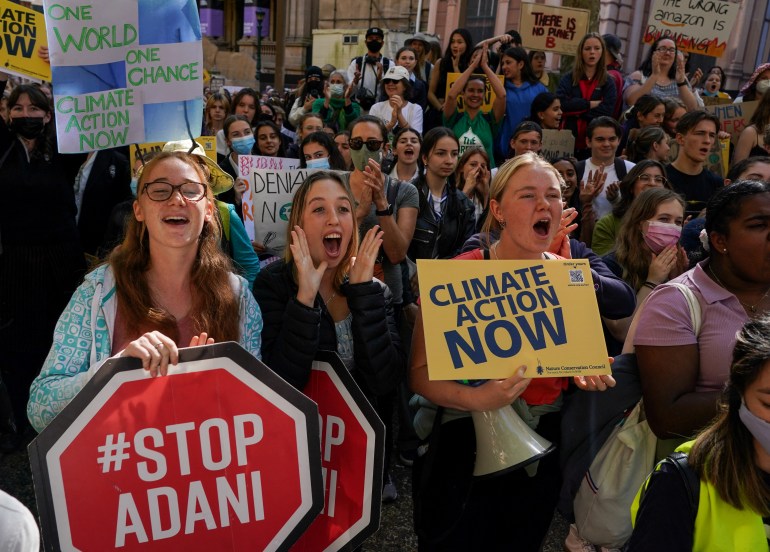
Polls have also found that young Australians are especially concerned about climate change. A 2021 survey from the Foundations For Tomorrow initiative found that 93 percent of Australians under 30 think the government is doing too little to tackle climate change.
Some 88 percent of Australians aged 18 to 24 are enrolled to vote, and voting is compulsory in Australia.
Assessing the policies
Many voters say they feel that there is little substantial difference between the Coalition and the Labor Party, who are currently in opposition, especially on climate change.
The Coalition has set a target to reduce emissions by 26 to 28 percent by 2030, based on 2005 levels. To do so, they say they will not move away from heavy polluters such as coal and gas but instead rely on carbon capture and storage, alongside new low emission technologies. The exact technologies have not been specified, mostly because they do not yet exist.
The Labor Party, led by Anthony Albanese, holds a 43 percent emissions reduction target by 2030, still below the expert-recommended target of 50 to 75 percent. If elected in May, Labor plans to invest heavily in renewables, creating more than 600,000 jobs in the process. Labor also has detailed strategies for supporting workers’ transition from fossil fuels to other sectors.
The Coalition and Labor agree that net zero should be achieved by 2050, yet both receive significant donations from the mining industry, more than any other sector. As with the Liberal Party, Labor will not sign the UN pledge to end coal fire power if elected.
Despite several high-profile commitments from energy producers such as AGL to shut down coal and gas plants earlier than previously planned, both major political parties have committed to continuing to support fossil fuels.
There are 114 new coal and gas projects on the government’s official register, such as the controversial gas extraction project in the Northern Territory’s Beetaloo Basin. Altogether, these projects would increase Australia’s emissions by more than 250 percent.
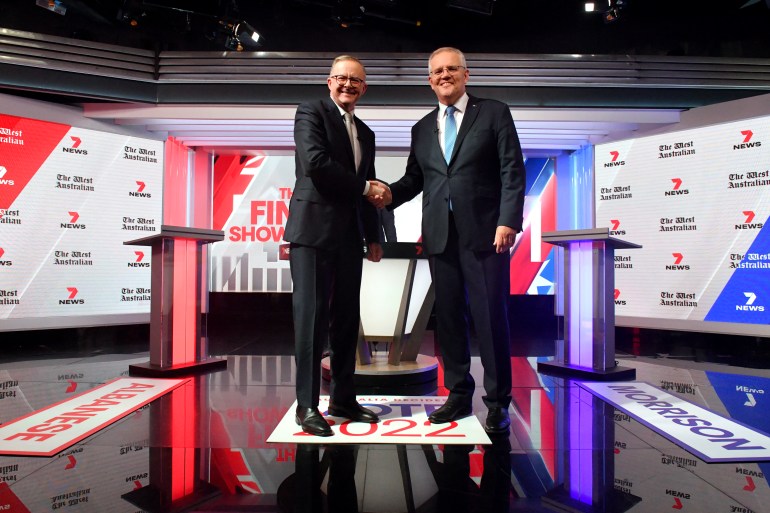
Despite the public concern, the Australian fossil fuels lobby has proved remarkably strong, claiming that mining props up the Australian economy – it contributes about 10 percent of the country’s gross domestic product and employs 261,000 people – and that without it, financial disaster looms.
The lobby has also used class rhetoric to place coal mining as a central element of regional working-class politics, encouraging both major parties to see being pro-fossil fuels as a vote winner.
The Greens – a left-wing environmental party often referred to as Australia’s ‘third party’ – are the only group to have argued the need for Australia to do more on climate. It has set a lofty 75 percent target for emissions reductions by 2030 and wants to see net zero achieved by 2035 or earlier, primarily through ending the mining, burning, and export of thermal coal by 2030.
The Greens’ campaign material describes net zero by 2050 as “a death sentence”. The party is now calling for a moratorium on new coal, gas, and oil projects.
“The mining and burning of coal and gas are the leading causes of the climate crisis,” said the Greens’ Adam Bandt of the demand.
“Keeping coal and gas in the ground is the very first thing a government would do if they were serious about treating global heating like the climate emergency that it is.”
One big question remains, however.
Just how much will voters actually put their climate concerns first when it comes to election day?
At the polling station, local issues can sometimes seem much more urgent.
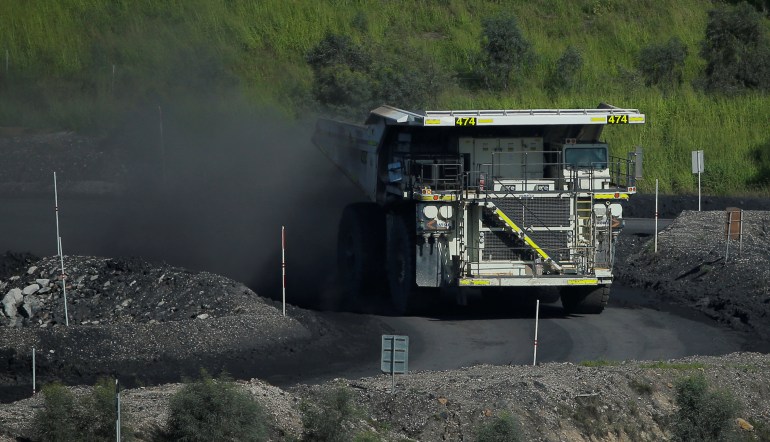
Inflation is at its highest in 20 years, with the price of everyday items like vegetables, meat, and petrol all increasing thanks to the war in Ukraine as well as the floods earlier this year.
Skyrocketing house prices and rents are also at the forefront of many people’s minds, as are key issues that were highlighted during the peak of the COVID-19 pandemic, such as aged care. And the central bank has just hiked interest rates for the first time since 2010.
“People have very much separated climate and politics,” agreed Joshi. “Someone can see climate change as an important issue, but still have a [negative] gut reaction to supporting the Greens.
“It’s worth noting that people will often express strong support for climate action in surveys, but have very confused and mixed views when it comes to its immediacy.”